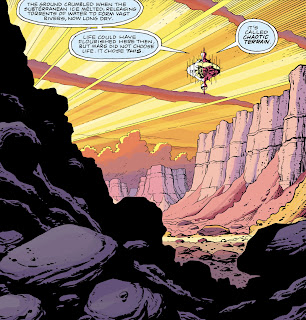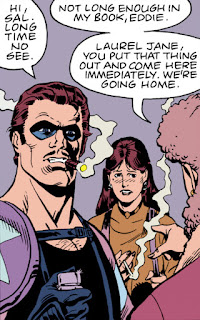After spending most of last issue showing the dangers of spending too much time living in the past, Moore focuses this issue on the dangers of avoiding the past. Unfortunately, he didn’t have quite enough material and once again had to rely on a fair amount of filler to reach that high page count.
This is an interesting attempt to show what it would look like for someone to be teleported.
I don’t think the effect works very well within the limitations of the comic book medium. But I do appreciate Dave Gibbons trying something new.
This is kind of funny, but mostly horrifying. A god-like being has spontaneously teleported a woman to another planet (mostly against her will), and completely forgot that she needs oxygen to breathe. How is Laurie supposed to convince him to save humanity when he is this far removed from the human race?
The god of Mars has constructed a cathedral to himself, bizarrely using pink glass to pay homage to his first true love — watchmaking. Gibbons perfectly captures the awe-inspiring absurdity of this world.
We long to see Laurie take a stand here — to openly defy Dr. Manhattan and the predestination he espouses. But, predictably, Laurie once again falls into doing exactly what the people around her told her to do. She ends up climbing Dr. Manhattan’s stairs, just as she helped Dan break out Rorschach, and just as she became the Silk Spectre in the first place.
The reflected face in the snow globe is another experiment of Gibbons’ that I don’t think works in a comic book. A valiant effort, but not for me.
It is understandable that the memory Laurie clings to as her “first” was a rare moment of solitude, as much of the rest of her life would be deprived of that secret and enchanted feeling.
Dr. Manhattan may experience the past, present and future simultaneously, and he may be removed from humanity to the point of forgetting about the necessity of oxygen, but he still has a little bit of human in him that is susceptible to jealousy and occasionally engaging in a little revisionist history.
This image took up two-thirds of the page. It’s nice, but it seems to me like Moore was running out of things to say.
I’m not sure why Laurie is so shocked to see Dr. Manhattan conjure water out of nothing. Hasn’t she seen enough of his powers to not be amazed anymore?
For all the Hollis Mason fans out there, let me present that time he casually asked a 16-year-old girl if she’d read a book about her mother’s attempted rape. Yes, even the most likable, admirable character in this story is fundamentally flawed.
One of the great tragedies of Laurie’s story is how at a young age she saw first-hand the horrific effects of a life spent being a “superhero.” But she was unable to break free of the life her mother laid out for her.
I want to show this panel to all the developers who insist on building in the Utah desert. Do we have to fill up every available spot of land? Can’t we just let the empty desert be an empty desert?
A landscape worthy of Spaceman Spiff. Yes, this is another needlessly massive panel eating up more space for this sparse story. But at least it’s pretty filler.
Man, teenage Laurie was horny! After spending a solid 10 minutes ogling Dr. Manhattan, she immediately starts flirting with the incredibly creepy Comedian.
Sally’s “not long enough” comment is interesting here. By the time of Eddie’s murder, it will have been long enough and she will look back on him with a sad fondness.
Another horrifying aspect of Dr. Manhattan’s passivity is the fact that he knows there’s an ominous gap in his future, but he doesn’t care to investigate it. He just accepts it as part of his otherworldly existence.
Fun fact: Olympus Mons doesn’t actually look like that. It’s so big, and its slope is so gradual, that the curvature of Mars prevents you from seeing it from the surface. Also, if you were on top it, you wouldn’t realize you were on a 13-mile high volcano because the top is so enormously wide.
Most of these artistic transitions work. But some of them, like this one, are a bit cheesy.
Finally! Laurie shows a little backbone! Unfortunately, this was the scene she referred to as “acting like an idiot.” But she was completely in the right here, especially considering Eddie’s wildly inappropriate behavior at this party.
It seems like Eddie genuinely regretted what he did to Sally. But before you feel too bad for him, remember the story of that gruesome scar. He murdered a woman that was pregnant with his child. So his “only once” line can’t carry very much weight.
Another spectacular image by Gibbons and colorist John Higgins. I really haven’t been giving Higgins the credit he deserves, but his work is truly astounding.
Believe it or not, Dr. Manhattan actually becomes a fairly decent therapist here. I love the line, “You’re deliberately shutting out understanding.”
This was a powerful reveal. Maybe a little more drawn out than I would like, but still effective. And I think Gibbons did a great job with the reflected face in the perfume bottle.
There was no logical reason for Dr. Manhattan’s cathedral to shatter like this. It was strong enough to support Laurie’s weight no problem. A little bottle of perfume shouldn’t bring it down. I guess Dr. Manhattan chose to destroy it for symbolic purposes.
I am really surprised that Moore and Gibbons chose an extreme zoom out in this moment. Dr. Manhattan has just realized that human life is a miracle and worth preserving — perhaps the most significant realization he’s ever had. But instead of closing in on these two individuals in this powerful, emotional moment, the comic keeps pulling away until they’re tiny specks.
Yes, there is a smiley face on Mars. Actually, there’s a couple of them, but this, the Galle crater, is the most prominent. Granted, it doesn’t look this clean and orderly, but it was really neat that Moore and Gibbons were able to use it in Watchmen.
The comic keeps on zooming out from this point until Mars and even the sun are just tiny, imperceptible dots in the cold, uncaring vastness of space. It’s an interesting juxtaposition to Dr. Manhattan tenderly telling Laurie to dry her eyes and rejoice in the miracle of life. Was Moore trying to say that Dr. Manhattan’s revelation was wrong? That he should have stayed away and given up on life? I don’t get it.
The supplemental material is pages from Sally’s old scrapbook — a collection of literal scraps of paper that anything to do with the Silk Spectre, no matter how unflattering the coverage. There really isn’t anything significant here — just another reminder of how shallow Sally was.
Sally openly mocked Captain Metropolis’ over-the-top cheesiness, yet she still agreed to join the Minutemen merely for the publicity. She primarily used her role as a “superhero” to become a celebrity. At least, as much of a celebrity as she could muster.
To show just how desperate Sally was for any attention whatsoever, she even preserved an incredibly negative review of the movie about her life. Normal people don’t do this. But in Moore’s world, the only who would become superheroes are the mentally unstable.
We do end on a thoughtful and heartbreaking look at the complicated emotions of so many victims of sexual assault. Part of me wishes we had more on that topic, but the other part says we got just enough here. Moore is exploring a lot of ideas in this story, and we don’t need too many diversions away from the main plot.

































No comments:
Post a Comment